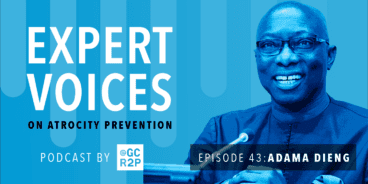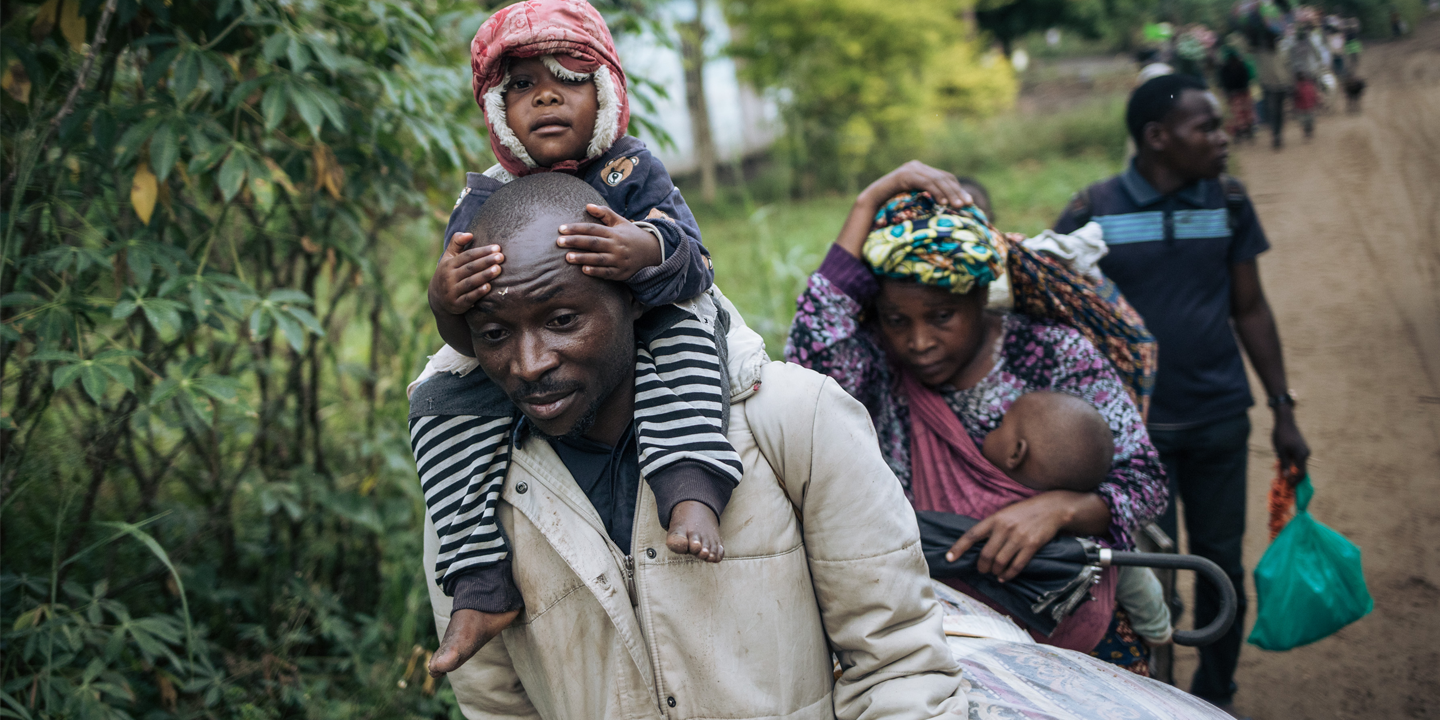

Atrocity Alert No. 205: UN Global Ceasefire, South Sudan and Myanmar (Burma)
Atrocity Alert is a weekly publication by the Global Centre for the Responsibility to Protect highlighting situations where populations are at risk of, or are enduring, mass atrocity crimes.
Despite UN’s global ceasefire call, 650,000 people displaced by conflict since March
Last Saturday, 23 May, marked two months since UN Secretary-General António Guterres appealed for all warring parties to observe a global ceasefire during the COVID-19 pandemic. Although 16 parties to conflicts in Latin America, Africa, the Middle East and East Asia have responded positively to the UN’s call, violence is increasing in some conflict zones as the deadly virus continues to spread.
For example, deadly inter-communal violence recently escalated in Jonglei State, South Sudan, at the same time that it was reported that President Salva Kiir, Vice President Riek Machar and other senior members of the Transitional Government of National Unity had tested positive for COVID-19.
Prior to the pandemic, there were already more than 70 million people displaced by conflict, persecution and atrocities around the world. The Norwegian Refugee Council (NRC) reported last week that between 23 March and 15 May, armed conflict in 19 countries resulted in the displacement of at least 661,000 more people, a number that does not include the thousands forced to flee in South Sudan since 16 May.
More than half of those displaced since March (482,000 people) are in the Democratic Republic of the Congo (DRC), particularly in the east of the country where various armed groups continue to perpetrate atrocities. The NRC also recorded more than 40,000 newly displaced across the Sahel (24,000 in Niger, 6,100 in Mali and 9,700 in Burkina Faso), as a result of ongoing attacks by armed Islamist groups, a cycle of deadly inter-communal violence, and grave human rights abuses perpetrated by national security forces during counter-terrorism operations.
The majority of displaced populations live in crowded camps or host communities under conditions that make social distancing near impossible. In Bangladesh, which hosts more than 900,000 Rohingya refugees, at least 29 people in the crowded camps at Cox’s Bazaar have tested positive for COVID-19, resulting in 15,000 refugees being placed under quarantine. However, isolation centers in the camps reportedly only have the capacity to treat 700 patients.
Two months since the UN Secretary-General’s global ceasefire call, the international community must intensify efforts to convince all parties to lay down their arms. In countries where various parties have formally agreed to local ceasefires – like Afghanistan, Syria and Yemen – signatories must rigorously implement and uphold these agreements.
Jaclyn Streitfeld-Hall, Publications Director at the Global Centre for the Responsibility to Protect, said that, “while COVID-19 has brought many things to a halt, respect for International Humanitarian and Human Rights Law should not be among them. All parties to armed conflicts around the world should silence their guns, mitigate the risks posed by the pandemic and stop targeting vulnerable populations.”
Inter-communal violence kills 300 people in South Sudan
Inter-communal violence erupted across 28 villages in Jonglei State, South Sudan, between 16-17 May, resulting in approximately 300 people being killed. The hostilities started when a group of armed men, allegedly from the Murle community, carried out an attack on six ethnic Lou Nuer villages. The perpetrators abducted women and destroyed dozens of houses, resulting in the displacement of thousands of people. Three humanitarian workers were also killed and warehouses storing life-saving supplies were raided.
Recurring inter-communal violence in South Sudan – often between pastoralist and agrarian communities fighting to control access to water and grazing land – has become increasingly militarized due to the proliferation of small arms and light weapons. Recent inter-communal clashes have taken place in Central and Western Equatoria, Jonglei, Unity and Warrap states. According to the Office of the UN High Commissioner for Human Rights, such clashes are the main source of violence against civilians, leading to 658 deaths, 592 abductions and 65 cases of sexual violence since the beginning of this year.
On 22 May the UN High Commissioner for Human Rights, Michelle Bachelet, called upon the authorities in South Sudan to “end these cycles of retaliatory violence, including by holding those responsible to account and promoting peacebuilding between individual communities.”
Despite the establishment of the Transitional Government of National Unity (TGoNU) on 22 February, critical issues related to the implementation of the 2018 Revitalized Agreement on the Resolution of the Conflict in the Republic of South Sudan remain unresolved. Delays in appointing state governors, due in part to continued disagreement over the number and boundaries of states, is creating a power vacuum that is “emboldening those involved in the fighting” according to David Shearer, Head of the UN Mission in South Sudan (UNMISS). Additionally, the disarmament process has stalled due to the lack of funding and the COVID-19 pandemic.
The TGoNU must ensure the protection of all civilians – regardless of ethnicity or political allegiance – and hold those responsible for inter-communal violence accountable. Together with UNMISS, the TGoNU should also help deter further violence by prioritizing disarmament and reconciliation efforts in both the Murle and Lou Nuer communities.
This week the UN Security Council also has an opportunity to send a strong message to the leaders of South Sudan and uphold its responsibility to protect by extending the arms embargo on the country and strengthening its enforcement. The proliferation of arms in South Sudan is a major contributing factor to recurring deadly inter-communal violence and armed rebellion.
Myanmar submits first report to ICJ in historic genocide case
On 23 January 2020 the International Court of Justice (ICJ) issued four provisional measures with which Myanmar must comply – prevent genocidal acts, ensure military, police and other forces do not commit genocidal acts, preserve all evidence of genocidal acts, and report on compliance with these measures. Last Saturday, 23 May, the government of Myanmar submitted its first report to the Court, detailing measures that it had taken in compliance with this order.
The ICJ issued the provisional measures as part of an ongoing case brought by The Gambia against Myanmar for violating the Genocide Convention, particularly during so-called “clearance operations” against the Rohingya between August and December 2017.
The authorities in Myanmar told news agencies that the confidential report focuses on three Presidential directives issued in April and May. The first two directives request all ministries and regional governments to “ensure that its personnel, officers, staff… and local people” do not commit genocide or destroy of evidence of genocide. The third directive urges officials to “take all possible measures to denounce and prevent all forms of hate speech.”
Despite issuing the directives, the government has not taken any meaningful action to dismantle discriminatory structures, including repealing or amending laws and policies that target the Rohingya. Dr. Simon Adams, Executive Director of the Global Centre for the Responsibility to Protect, said that, “Until Myanmar’s discriminatory laws are abolished and the Generals who are responsible for the genocide are held accountable, the threat of further atrocities remains.”
Meanwhile, armed conflict continues in Rakhine State between the military and the Arakan Army, a non-state armed group seeking greater autonomy for the ethnic Rakhine Buddhist population. Satellite imagery collected by Human Rights Watch reveals that at least 200 homes and other buildings in the predominantly ethnic Rakhine village of Let Kar were destroyed by fire on 16 May. Human Rights Watch stated that “the imagery of Let Kar bears a close resemblance to patterns of fires and widespread arson attacks by the Myanmar military on ethnic Rohingya villages in Rakhine State in 2012, 2016, and 2017.”
As COVID-19 continues to spread in Myanmar, the military should negotiate an immediate ceasefire in Rakhine State and provide unfettered access for humanitarian organizations.
Related Content


Atrocity Alert No. 434: Sudan, Ethiopia and the UN Human Rights Council
